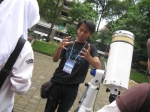The Dutch Professor Reveals Fossil Substitute Organisms at the BE Fest Event
By Anggun Nindita
Editor Anggun Nindita
JATINANGOR, itb.ac.id - The Agroecology and Bioproduct Technology Scientific Group (KK ATB), School of Life Sciences and Technology, Institut Teknologi Bandung (SITH ITB) held the Bioengineering Festival (BE Fest) 2023 with the theme "Biomass Valorization to Produce Bioproducts", at Labtek IA, ITB Jatinangor Campus, Thursday (16/11/2023). One of the activities was a sharing session on bioengineering from the Scientific Director of the Engineering and Technology, Institute Groningen, the Netherlands, Prof. Dr. Ir. Hero Jan (H.J.) Heeres.
Prof. Heeres delivered one of the innovative solutions to not depend on fossil fuels as a source of energy and materials.
He said that fuel limitations cannot be sustained in the long term. One of the solutions found that is more sustainable is to utilize biomass as a source of energy and industrial raw materials.
With the material entitled "From Biomass to Biobased Chemicals: The Seaweed Case", Prof. Heeres brought an interesting perspective on the potential of biomass, particularly red seaweed (Eucheuma Cottonii), as a reliable resource for producing bio-based chemicals. Red seaweed is a third-generation biomass or non-food biomass.
The organism is capable of growing in a variety of environments, including freshwater, saltwater and urban wastewater. Red seaweed grows relatively fast and can be harvested within six weeks. The carbohydrate content is also high, reaching 84 percent. In addition, there is no lignin content in red seaweed, making it easy to break down.
"Red seaweed contains carrageenan and agarose compounds," he said. Both compounds play an important role in the food and pharmaceutical industries. Carrageenan as a gelling agent, stabilizer, and thickener, is used in various food and beverage products. Meanwhile, agarose, which has the ability to form gels, is widely used in biomolecular separation techniques such as electrophoresis.
His concept is "Biomass to Biobased Chemicals", converting biomass, especially red seaweed, into bio-based chemicals. Through a kinetic model approach of galactose (GAL) and 3,6-anhydro-D-galactose (D-AHG), red seaweed can be processed into essential chemical compounds such as 5-Hydroxymethylfurfural (HMF) and levulinic acid (LA). Both compounds have great potential as feedstock for plastics, fuels or solvents. This proves that biomass can be a key driver in the production of sustainable chemicals.
Prof. Heeres emphasizes that the key to maximizing this biomass conversion potential is to determine the right kinetic model and design the optimal reactor. By exploring deeper knowledge related to reaction kinetics and reactor operating conditions, it is hoped that product yields can increase.
Prof. Heeres provided insight into research and innovation in the field of green chemistry that can bring positive changes to the future of the industry. Red seaweed converted into bio-based chemicals also supports the development of renewable resources and reduces the chemical industry's footprint on the environment.
Reporter: Ardiansyah Satria Aradhana (Rekayasa Pertanian, 2020)
Translator: Anggi Nurdiani (Manajemen, 2021)
Editor: Sherina Wijaya

.jpg)

.jpg)
.jpg)
.jpg)

.jpeg)
